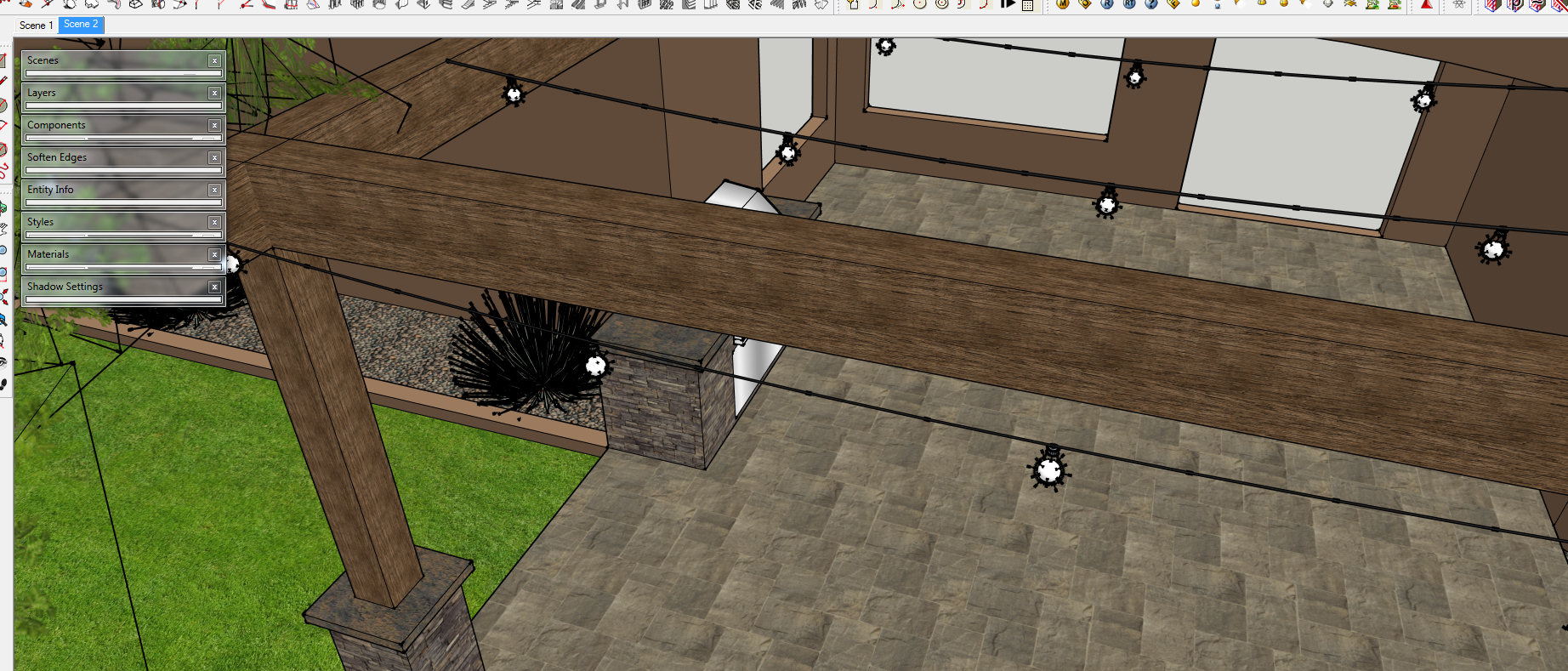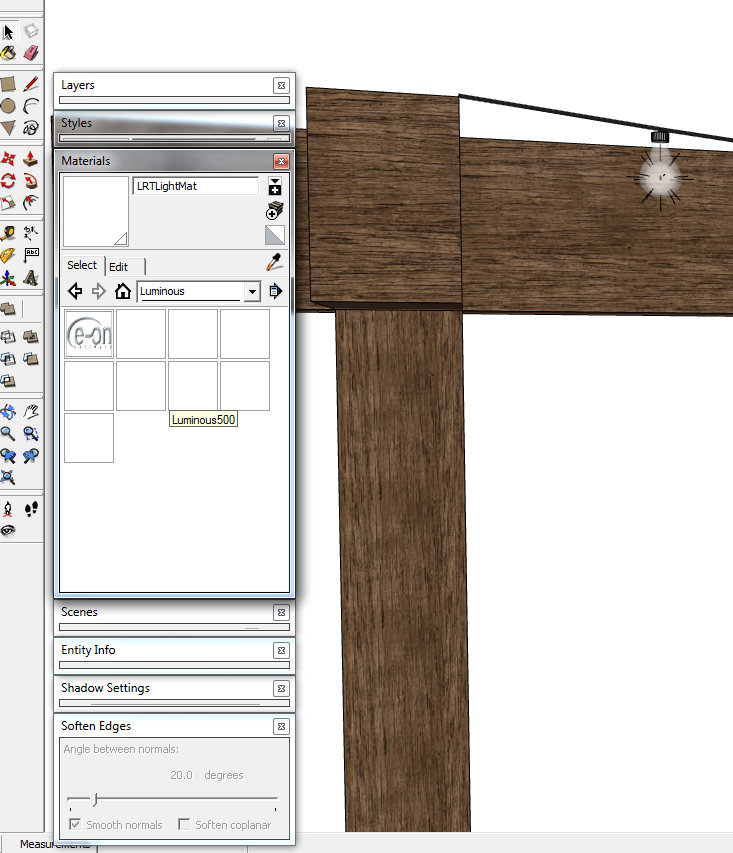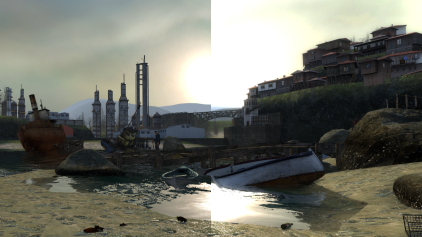LumenRT Training Needed - Willing to pay.....
-
@solo said:
Using SU scale tool.
lol... that is the missing link in my head... treat the LumenRT components as any other component. Scale, Copy, etc...
-
When you export to live cube you press TAB and it will open up a menu on the left side where you can go into the lights menu and adjust the lights one by one, if you have a ton of lights it becomes a pain in the arse, there is no way to group adjust them.
-
Also notice how I reduced the amount of lights, less is best here, trust me.

-
OK. Cool.
Next question is about the glass bulb. Is there a way to make the glass bulb itself glow like it is frosted or translucent vs transparent?
-
You can make the bulb a luminous material and not use the point lights, but then you do not have intensity control in live cube

-
OK. So here is a test of Luminous Materials vs Point Light in LumenRT.
Luminous Materials - Luminous 1000


Point Light - Incandescent - 2500 lumens


Point Light - Incandescent - 10,000 lumens

I have tried to place the point light inside of and also overlap the luminous material to get the luminous material to cast a shadow. No luck either way.
-
What if you put the point light inside the luminous material, so you get shadows and the frosted light bulb effect?
-
This is a great thread and very generous of Solo to help out. Amazing forum work.
-
@d12dozr said:
What if you put the point light inside the luminous material, so you get shadows and the frosted light bulb effect?
Thanks d12dozr
I have also tried that. When I scale the point light down small enough and insert it into the luminous material the luminous material blocks the point light from escaping and does not create shadows.
It seems like the point light treats the luminous material as a solid object.
-
@olishea said:
This is a great thread and very generous of Solo to help out. Amazing forum work.
I agree olishea.
I am very grateful to solo for the help. I also upgraded my membership from free to premium as a way to show thanks to SketcUcation and support these forums.
-
@jawsnaz said:
...
I have also tried that. When I scale the point light down small enough and insert it into the luminous material the luminous material blocks the point light from escaping and does not create shadows.It seems like the point light treats the luminous material as a solid object.
Ok, what if you paint the inside of the luminous material with a transparent material? I don't have LumenRT 4, or I'd try it myself...
-
@d12dozr said:
@jawsnaz said:
...
I have also tried that. When I scale the point light down small enough and insert it into the luminous material the luminous material blocks the point light from escaping and does not create shadows.It seems like the point light treats the luminous material as a solid object.
Ok, what if you paint the inside of the luminous material with a transparent material? I don't have LumenRT 4, or I'd try it myself...
OK. I tried to paint the inside of the sphere with the luminous material with no change to getting the shadows but that idea worked somewhat. We are getting closer.
Here is the sphere with a point light in it.
The outside and the inside of the sphere are painted with LumenRT Materials - Translucent / Frosted Grainy Glass with the LumenRT - Point Light / Incandescent / 10,000 lumens scaled down and inserted into the sphere.


-
OK. So here is my latest go at it.
I painted the light bulbs with Luminous material and created a point light just below the light bulb. I get the glow of the luminous material and I get the light pattern I am looking for.
What do you guys think?


-

That works.
The question I have is are you having fun?
If yes, then you are doing it right.
So what else can I help with, I am around but distracted due to the silly season, so ask away and I'll jump in as I can.
-
@solo said:
:thumb:
That works.
The question I have is are you having fun?
If yes, then you are doing it right.
So what else can I help with, I am around but distracted due to the silly season, so ask away and I'll jump in as I can.
Answer is yes. I am loving it! It is much easier to learn with your help. At least you can point me in the right direction so I am not floundering around aimlessly. Thank you!
Next would be general ambient light. Is there a setting to bring up the general brightness so that it isn't pitch black in the areas that are not being illuminated by light sources?
-
@unknownuser said:
Next would be general ambient light. Is there a setting to bring up the general brightness so that it isn't pitch black in the areas that are not being illuminated by light sources?
Do you have a scene in particular? interior or exterior?
-
I am still playing around with the lighting but here is a couple of pictures.



-
One suggestion would be to use a night time HDR image.
Looking good so far.
-
@jawsnaz said:
...
I painted the light bulbs with Luminous material and created a point light just below the light bulb. I get the glow of the luminous material and I get the light pattern I am looking for.Nice solution. Fire looks great too!
-
OK solo. So when you get back from enjoying the "silly season" as you call it lol, maybe you can walk us through using a HDR image.
I am self-taught and have zero computer art schooling so HDR is a new term for me. I looked it up. Thanks for the point in the right direction again.
This is very interesting.
High-dynamic-range rendering (HDRR or HDR rendering), also known as high-dynamic-range lighting, is the rendering of computer graphics scenes by using lighting calculations done in a larger dynamic range. This allows preservation of details that may be lost due to limiting contrast ratios. Video games and computer-generated movies and special effects benefit from this as it creates more realistic scenes than with the more simplistic lighting models used.
Advertisement








